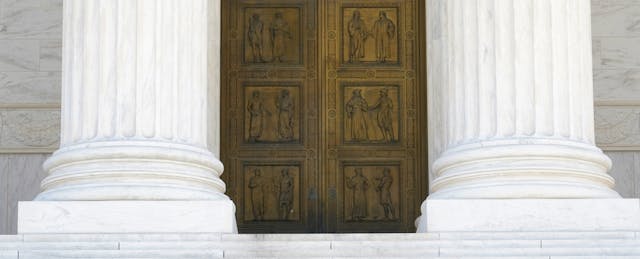Although it is not known for swiftness, the Supreme Court surprised the nation last week with a relatively speedy decision on its first case involving charter schools.
The court heard oral arguments for St. Isidore of Seville Catholic Virtual School v. Drummond at the end of April, less than a month before issuing its decision. Arising out of a contested charter grant issued to an openly religious virtual charter school in Oklahoma, the case was a test of both the long-standing interpretation of separation of church and state as well as the nature of charter schools, William Koski, founder and director of Stanford Law School’s Youth and Education Law Project, previously explained to EdSurge.
In essence, St. Isidore argued that Oklahoma denying the school a state public charter amounted to religious discrimination, while Oklahoma State Attorney General Gentner Drummond argued that granting a charter to the school was unconstitutional under the U.S. Constitution, the Oklahoma state constitution and other state statutes, in part because the school was open about intending to perform religious instruction.
The case followed a trio of Supreme Court decisions in recent years that supporters of St. Isidore argued struck down states’ attempts to exclude religious schools, parents and students from publicly available benefits based solely on religion, Koski told EdSurge.
The Supreme Court returned a 4-4 decision. Justice Amy Coney Barrett recused herself from the case. So the split decision means that the Court’s indecisiveness was, in a sense, decisive, as the case reverts back to the decision of the lower court, as if the high court had never taken it up. The lower court had previously sided with State Attorney General Drummond, who argued that the charter violated state and federal rules.
For charter school advocates, the decision was a relief — and a close call.
Charter schools were always a compromise, supporters say. They are public schools meant to expand options to families while remaining accountable to taxpayers, argued Starlee Coleman, president of the National Alliance for Public Charter Schools, in a statement. “[P]ublic charter schools are just that, public,” she wrote, adding that the decision should give clarity to families.
The decision has also emboldened opponents of the emerging school choice movement, which aims to give parents options beyond the assigned district public school, often using public dollars to do so.
But just days before the Supreme Court decision, some members of the charter school movement told EdSurge that they were nervous.
The case was considered a toss up. Had a single vote swung the other way, it would have opened public funds to private religious schools. But advocates for the charter movement were primarily worried that it would have been a huge blow to what they see as a successful and necessary model of education.
That’s because they believed it would upset the delicate balance of private and public features that charter schools require, by classifying these schools as private. Some worried that repercussions would follow, and charter organizations were preparing legislative and legal strategies in case St. Isidore’s case was successful.
Even a narrow victory for St. Isidore could set off a deluge of destructive legislative efforts meant to undermine the existence of charter schools, said Derrell Bradford, president of 50CAN, which lobbies for independent schools, before the decision.
Partly, these schools are successful because they can access public money while retaining the unique character of an independent school, he added.
The dangers were significant.
In most states, charter schools rely on the same funding mechanisms as public schools, said Eric Paisner, COO of the National Alliance for Public Charter Schools, on a call before the decision. Classifying charter schools as private would have opened questions about whether that could continue across the states, he said.
In addition to threatening a loss of public funding, it also would have raised new questions about whether employees for these schools could participate in state pension and health care programs, and whether charter programs could access school buildings, he added.
So whether or not the Supreme Court intended it this way, taking oral arguments both caused insecurity, and then served as a talking cure for proponents of the public charter movement.
But that likely won’t hinder private voucher advocates.
Despite the ruling, private school alternatives continue to make headway across the country. For instance, House Republicans’ reconciliation bill is en route to the Senate, and it has an expansive national voucher program that would open up funding for private options nationwide.


